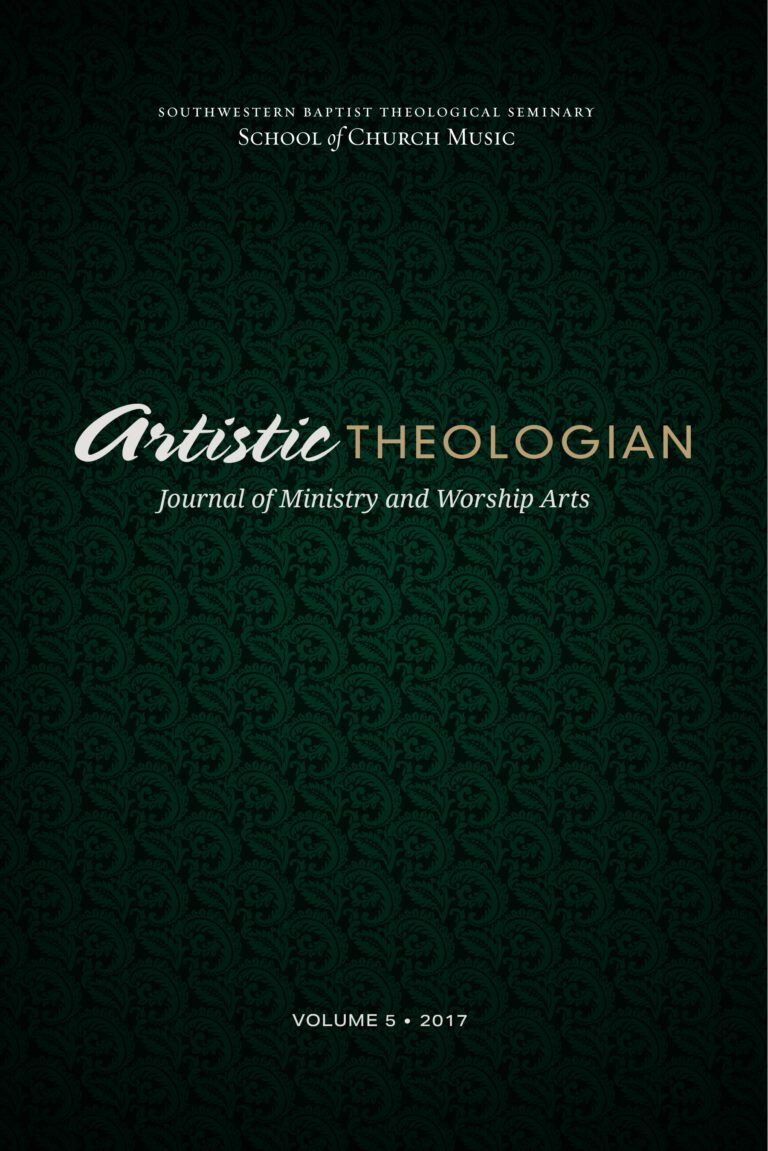
Forming Disciples through Corporate Worship
Artistic Theologian
Volume 5, Summer 2017
Editor-in-Chief: Scott Aniol
Music, Modernity, and God: Essays in Listening, by Jeremy Begbie. New York: Oxford University Press, 2013. 261 pp. $55.00.
“[Your] efforts were doomed to failure from the start, since music and theology were fundamentally incommensurable: one deals with the affective and connotational, the other with the conceptual” (206). This quote is an extemporaneous comment by an attendee at an occasion where Jeremy Begbie was addressing the topic of music and theology. In this book, he addresses the overarching discourse between music and theological language by examining historical-musical examples of intellectual paradigm shifts (he terms the shift “modernity”) (7). By citing musicians and theologians, he demonstrates that even the connotative ontology of musical sound can “contribute to the formation of theological language” (194) and proves that the existing “zero-sum” understanding of theology (144) can be altered by the “interpenetration” model (165).
Begbie tries to shake off the long-term zero-sum struggles (like a tug-of-war fight) between sound and word, harmony and melody, and musical denotation and connotation, and he suggests that the new approach of interpenetration understanding of sound not only benefits the musical realm but also theological controversies, such as temporal transience and eternity, God’s transcendence and immanence, and divine sovereignty and human free will.
As his first example, Begbie launches his sound-word discourse by visiting the prominent Reformation duo of Luther and Calvin. The former believes that music is supportive for people to acquire universals, such as divinity; the latter treats music as tempered and “subservient” to biblical texts on which the congregation should focus (24). Here, Begbie states that the two-fold differentiations between music and word, and divinity and humanity, do not need to be viewed as a zero-sum rival but parallel interpenetrated partners.
In another example, Begbie cites two Bach scholars, John Butt and Karol Berger, and their discussions on the temporal concept of Bach’s music. Butt proposes that Bach’s compositions were not following “an external, pre-given logic,” but they explore the form and potential of the materials (48)—a sense of continuation. Berger asserts that the pre-classical compositional concept of time was a “circularized” time, and Bach’s music was a model of “neutralizing” time (55–56). Here, Begbie rejects and criticizes the asserted dichotomy of God’s time and eternity (59–60). He further contends that the biblical concept of eternity does not dismiss “the successiveness, transience, and the openness of the future to the new,” in which they were all engaged in the incarnated Christ (60). In other words, instead of contention, Bach’s music demonstrates the simultaneous, transient, and eternal natures of Christ.
Begbie climaxes his argument by utilizing Victor Zuckerkandl and Roger Scruton’s concept of audibilia (sound-space) to provide an alternative to the zero-sum theological understanding (156). When two distinct musical sounds exist in the same space (not sharing the space) and same time, they are mutually and ontologically interpenetrated “without merging, self-abnegating, suppressing (either side), or self-emptying” (159). Begbie propels this idea to shed light on the classic notion of God’s transcendence and immanence, his there-ness and here-ness, and as sovereign and giver of free will. Furthermore, it empowers the contemplation of Christ’s divine-human nature as the “co-presence” of two spaces: “the Son sharing created space while yet remaining the Father’s eternal Son and thus primordially inhabiting God’s eternal Trinitarian space” (168).
As a conclusion to his book, Begbie recaps that orthodox Christianity’s default communication, in both experience and expression, has been verbal language that is deeply embedded in our finitude and cultural, social, and political inclinations. He challenges the notion that “the more doctrinal language can be isolated from non-linguistic media, the more faithfully it will render theological truth” (204): a serious revision of connotational theology and conceptual music dichotomy is needed.
In his writing, Begbie draws a pool of witnesses, both pre-modern and modern, musical and theological, into the roundtable of discussion. He builds his argument by detailing the intellectual shift of figures in theology and musicology, dissects some theological aporias in history, and explains how the ontological and structural understanding of musical sounds may benefit the discussion. Within this strong proposition, however, Begbie almost misguides his audience on the apprehension of the term “modernity.” Although he briefly explains his definition of the word—equating “modernity” with the shift of intellectual paradigm—it does not fully align with the contemporary understanding of the term; thus, “modern” or “modernity” plays an obscure role in his main thesis on “co-existence” and “interpenetration.”
Nonetheless, Begbie effectively and thoroughly examines the natures of both verbal and doctrinal languages that communicate and miscommunicate. Meanwhile, his discussions branch out to various disciplinary areas and create further applications to contrasting concepts, such as cosmology and anthropology, confinement and freedom, discovery and inventiveness, creation and human culture, eternity and transience, metaphysics and metalinguistics. The perspicacity to explore and expand the capacity of musical sound and its semantic applications certainly carries a huge impact on contemporary theological discourses. Begbie tries to leave an open end to each contemplation; yet, he always directs his readers back to the mandatory boundary of Christological soteriology and aesthetics: “Can music reveal the grace of the Creator directly? Can music without directly associated texts function as ‘iconic’ of the glory of God?” (216) This is the perimeter and purpose of this scholarly research that, at the same time, is an introduction leading to a farther and wider study.
Ian Hin-Kei Yeung
Southwestern Baptist Theological Seminary





